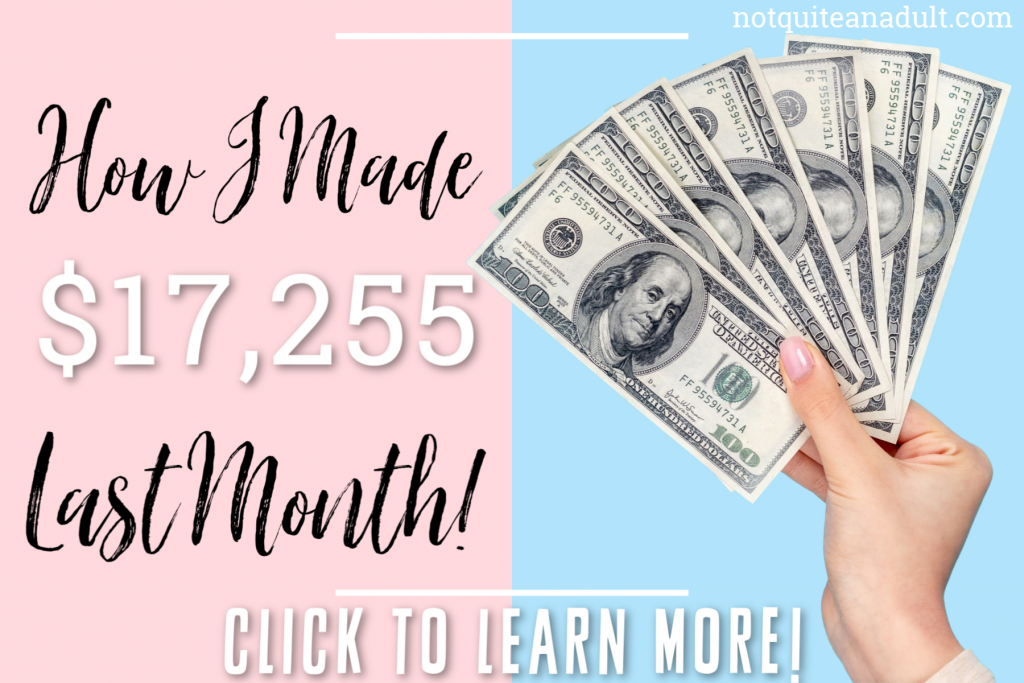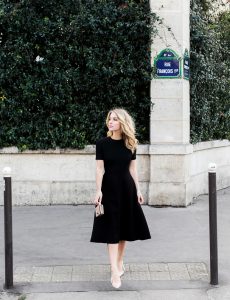One of the hardest lessons I have ever had to learn was how to stop spending money you don’t have. I’m a chronic spender. It’s one of my biggest flaws. I’ll go into a store to buy some gluten-free bread (anyone else allergic to gluten and wanna be buddies? email me!) and I’ll leave the store with 10 things I didn’t need.
We’ve all been there. A friend asks us to dinner but we say we can’t afford it and then we go out and spend $50 on a new pair of shoes? Anyone else? OR you can’t afford to build a business because you keep spending your money on things instead of education? Yeah. This one hits home for me really hard.
It’s really important to understand that when it comes to your finances, you must make room for what you want. If you want to have more money, you’ll need to put in the effort to do so. If you want to learn how to stop spending money you don’t have, you’re going to need to make some room in that big beautiful brain of yours to learn how to do it.
It’s really important that you learn these kinds of skills before you end up in a worst case scenario type situation or things will just continue to get worse. What if you lost your job tomorrow? Wouldn’t it be nice to have a fat emergency fund instead of that nice pair of shoes?
Okay, okay. I’ll stop rambling. Just one more point. Most people who say they have no money actually make a decent amount of money. They just don’t have a proper plan in place to handle that money. Do you have a plan?
Anyway, let’s dig into how to stop spending money you don’t have!

Table of Contents
11 Ways to Stop Spending Money You Don’t Have
1. Start With Goals
I always want to start with goal setting for your finances because having well thought out goals is the best way to motivate yourself to stick to it. When I think about financial goals, I’m a big fan of having 3 different kinds of goals.
- Long-Term Goals
- Short-Term Goals
- Super Short-Term Goals
Let’s first start with our long term goals. These ones are arguably the most important because they help us to think through our daily habits and be more frugal in the process. Long-term goals are more like a financial five-year plan or longer. Having long-term goals is going to teach you how to stop spending money you don’t have because you’ll always have these goals in the back of your mind to convince you not to make that impulse purchase at target.
Some long-term goals you could set can include:
- Paying off Student Loan Debt
- Paying off Credit Card Debt
- Saving for a Down Payment
- Saving for your Kid’s Education
- Etc.
Next, we have our short-term goals. These goals are more focused on a year to six month’s time. These goals are important because they help you to do the things you want to do without putting you in debt. Some ideas for short-term goals can include:
- Saving for a Car Downpayment
- Saving for Christmas
- Saving for a Trip
- Etc.
Finally, we have our super short-term goals. These goals are more of a week in time and are a great way to save money on things like groceries. Some examples of these super short-term goals can include:
- Only spend $50 on groceries for the week
- Only spend $20 on gasoline for the week
- Only eat out once this week
- Spend $0 on clothes and cosmetics
- Etc.
Now that you have an understanding of the three types of goals you need to set for your finances, take some time to think about them before we move on to more information on how to stop spending money you don’t have.
2. Have a Detailed Budget
Having a budget is the single most intelligent thing you can do for your finances, regardless of your financial situation. Even if you make $100,000 a year, it’s still important that you have a budget.
A budget will make a serious plan for your money and give you a bit less wiggle room for making bad purchases. If you’re a chronic over spender, it might be time to start budgeting weekly or bi-weekly instead of trying out a monthly budget.
Having a monthly budget is better for people who are awesome with their money and don’t need a strict plan to get it going. If I were going to suggest a specific type of budget to you, it would be the Zero-Based Budget because it makes a plan for every single dollar you earn and gives that dollar a job.
If you have absolutely no idea where you should start with creating your first budget, I suggest that you check out Budgeting for Beginners: 7 Steps for Success. That article will teach you almost everything you need to know.
3. Create a Meal Plan
One of the biggest places where people tend to overspend is on groceries and eating out. I’ll admit, this is me. I love eating out. I love ordering in. I’ll do just about anything if it means that I won’t have to cook tonight.
Having a meal plan is the best way to combat that intense urge to spend money on food. When you have a great meal plan, you’ll buy exactly what you need without the urge to spend money on extras and it should help you from eating out 5 days a week.
My absolute favourite way to meal plan doesn’t involve that much work at all actually. I use $5 Meal Plan! This website will send you a detailed meal plan and a grocery list each week for you to use and it makes everything so much easier! You even get to join a Facebook Community to make some friends.
4. Always Shop With a List
A really important way to figure out how to stop spending money you don’t have is to only ever shop with a list. Having a shopping list is going to make sure that you aren’t making as many impulse purchases and if you can stick to your list perfectly you’ll save a whole bunch of money.
If you’re anything like me, you may be very bad at making a grocery list which is why I LOVE $5 Meal plan, since they send you one that corresponds with your meal plan.
The hardest part for me and making a grocery list is that I always forget to check my cabinets before I start making my list and end up with doubles of half the things I bought, essentially just wasting money. Be sure to check your inventory of items you already have before ever starting a list.
Now, shopping with a list isn’t only a good idea when it comes to grocery shopping. You should also shop with a list when you’re shopping for clothes, shoes, and other things as well so you don’t get carried away.
Something really important about making a list is sticking to the list. If you put in the effort of making the list, maybe do yourself a favour and don’t stray from the list you just created!
5. Stop Social Shopping
Some of the worst times where I spend too much money is when I’m at the mall doing some social shopping with a group of friends. This is especially bad because friends don’t always know the total picture of our finances.
Have you ever been shopping with a friend and seen something you want, and your friend eggs you on and convinces you to buy it? I’ve been there. I’ve also been that friend…
If you’re trying to figure out how to stop spending money you don’t have, you really should get out of stores and stop convincing yourself that you’re strong enough to just look and not actually buy.
Shopping as a social activity is never really a good idea, it can seem like it on the surface, but you’ll end up spending money you don’t have and buying things you don’t need. Stay out of the stores!
6. Figure Out Your Triggers
Before you can truly do any work on yourself, regardless of the area of your life, you must figure out your triggers. In this case, it’s your spending triggers. When are you most likely to spend money you don’t have?
Are you an emotional shopper? This is me. I shop when I’m feeling sad, I shop when I’m feeling happy. I just love to buy things but 99.9% of the time, they’re things I don’t actually need. Emotional shopping is super common, so don’t feel bad if it’s you. It’s just all about figuring out different ways to deal with these spending triggers.
Are you a boredom shopper? I find that whenever I don’t have something to occupy a few minutes of my time, I’ll open my email. This leads to me reading store emails and shopping on my phone for 20-30 minutes and then feeling empty after I buy. I’ve learned to unsubscribe to these emails so I don’t have as much pulling me into online stores.
Are you a chronic late night online shopper? I once had a friend who ordered $300 worth of products on Amazon at 4 o’clock in the morning after a night out. She started getting packages in the mail and was utterly confused, but it was all things she couldn’t afford and had to go through the annoyance of sending it back.
- Bonus Tip: A really good way to deal with a lot of common spending problems is to implement the 30-Day Rule!
7. Cut Out Credit Cards
If you’re the type of person who need to learn how to stop spending money you don’t have, I’m going to assume that you put a purchase or two on a credit card. If you’re spending money you don’t have, how else could you be paying for it?
Credit cards aren’t evil. There are a lot of financial gurus who are entirely against credit cards and think they are worse than murder (okay just kidding, but they act like it). If you are the type to be great with your finances, never carry a credit card balance, and use credit cards intelligently, then go ahead, use credit cards!
However, if you have the personality trait where you are convinced that having a credit card means you have more money available to spend than maybe stay away from them. If you’re really serious about figuring out how to stop spending money you don’t have, give your credit cards to someone else to hang on to for a while. At least until you can trust yourself to not buy things you can’t afford.
8. Try an all Cash Budget
There have been a ton of studies done that say that using plastic to spend money means we have less of an emotional connection to our money. This even counts for using a debit card, not just credit. That’s why so many financial bloggers swear by the all-cash budget, or cash envelopes.
When we spend actual, physical money on our weekly purchases, it’s a lot easier to stick to a budget, since you can’t actually spend anything extra! I’m sure that you’ve read other articles about saving money and you’ve heard about a cash budget before, but have never done it? Why? Because it’s hard.
If you really want to learn how to stop spending money you don’t have, it’s definitely time to try out a cash budget and truly save money.
I’m no expert on teaching about an all cash budget, however, this awesome article from the budget mom can teach you everything you need to know.
9. Find Free Entertainment
A really huge part of a person’s budget is entertainment and recreation. This includes things like movies, dinners out, exercise, etc. Entertainment is the easiest place to stop spending money you don’t have because none of this stuff if absolutely necessary for you to survive.
Some really great places where you can stop spending money you don’t have can include:
- Cutting Out a Gym Membership and working out at home
- Having a potluck dinner at home with your friends
- Going for a long walk instead of a date night
- etc
You can check out this article from Caroline Vencil with a ton of ideas for free entertainment.
10. Track Your Spending
When we think of spending money we don’t have, we often think about purchases that are at least $20 or more. What we forget is that those little two and three dollar purchases add up to be $20+ really quickly. Of course it’s also important to track your big expenses, but those little ones can sneak by without us realizing it.
Think of it this way, if you save $5 a day from little expenses, you’ll be saving over $100 a month. That’s a nice chunk of change. One of my favourite ways to track my spending is by using the Highlighter Budgeting Method. It’s simple, effective, and very very colourful.
11. Stop Trying to Impress People
One of the biggest reasons why we spend money that we don’t have is because we’re trying to keep up with the joneses. We see people on social media or walking down the street who have nicer cars, clothes, houses, shoes, etc. and it triggers something in our brains that convinces us we need that kinda stuff too.
The second you throw away that keep up with the joneses mindset and you start doing things for you, you’ll find that your entire life will be different. You’ll stop caring what people think about your old shoes, and you’ll be happy with having extra cash in the bank and no consumer debt.
Take pride in your $10 shoes and your $20 hand bag. You don’t need to wear designer clothing. And, insider tip, most people who do need to wear designer labels aren’t too happy with themselves and need to compensate.
Bonus tip: Figure Out Your Hourly Wage
This is one of my favourite little hacks for saving money and being more concious about your spending. So, let’s say you’re at a store and you really want to buy a $45 pilllow for your couch. Why are throw pillows so expensive?
Anyway, normally you’d just throw the pillow in your cart and think about the money later. That’s the wrong way to go. All you need to do is think about how many hours do you need to work to pay for this item?
Let’s say you work an hourly wage job and make $10 an hour. It would take you over 4.5 hours of work to pay for one single throw pillow. When I worked an hourly wage job, I did this all the time because that job was torture and was a ton of work. 4.5 hours of my life was not worth a single pillow.
This way of thinking about the cost of an item will stop a lot of impulse spending before it even happens and can really help you save money!
Final Thoughts
I’m really glad that you decided to read this article and really learn how to stop spending money you don’t have. It’s an important lesson to learn and it can really change your money mindset and your financial future! I hope it helped. Thanks for reading!




Leave a Reply